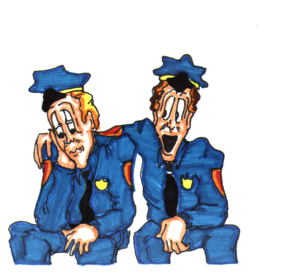Police Psychology | Anger!
Nancy K Bohl-Penrod PhD, Director of the Counseling Team International
and The Southern California Critical Incident Stress Management Team
I am angry right now. I am seething and boiling. I am sure many of you feel the same way. First there is Dallas and now Louisiana. Cops getting killed. I am on fire. This has got to stop. I know what the research tells us about anger, “Ninety percent of anger is unjustified”. Well, guess what? Not today. These feelings are justified. You do not have to live in Dallas, or Baton Rough to be livid. What worries me, is the negative impact this intense feeling of rage we may be experiencing can have on all of us.
To all officers, please understand anger is a normal emotion caused by grief, frustration or tragic situations where you feel you, your department or profession has been wronged. Of course, in both of these horrific situations, we have all been wronged and our family members. There are times that anger and frustration can be useful, as long as it is expressed effectively. This is going to be difficult, but you have to control your rage, and remain professional. When anger is expressed correctly, it can protect you from threats to your safety, well-being, happiness, self-esteem and from losing your career. (more…)
 Thin Blue Mind / Smokey Heroes
Thin Blue Mind / Smokey Heroes

 together as a team to stop crime. Not one of their powers is complete, but together they are unstoppable. In fact in each adventure, at least one of them is in jeopardy, but gets saved by the other. They are effective as a team and that is why we like them so much.
together as a team to stop crime. Not one of their powers is complete, but together they are unstoppable. In fact in each adventure, at least one of them is in jeopardy, but gets saved by the other. They are effective as a team and that is why we like them so much.  to be in the program “peer counselors”. The programs were originally created, because of the increase in alcohol abuse and the disciplines surrounding the abuse. Their programs followed the Alcoholics Anonymous 12-step program. The peer counselors (supporters) were in “recovery” and it was assumed the best fit to help others with their alcohol problems.
to be in the program “peer counselors”. The programs were originally created, because of the increase in alcohol abuse and the disciplines surrounding the abuse. Their programs followed the Alcoholics Anonymous 12-step program. The peer counselors (supporters) were in “recovery” and it was assumed the best fit to help others with their alcohol problems. you can add a pint of beer or a shot to the mix and see how hard it is to control the car with the extra drink. Essentially, you feel like you are separate from the vehicle, and the vehicle is doing whatever it wants. Until you crash and burn at the end. You almost always crash and burn or else there was no lesson taught.
you can add a pint of beer or a shot to the mix and see how hard it is to control the car with the extra drink. Essentially, you feel like you are separate from the vehicle, and the vehicle is doing whatever it wants. Until you crash and burn at the end. You almost always crash and burn or else there was no lesson taught.